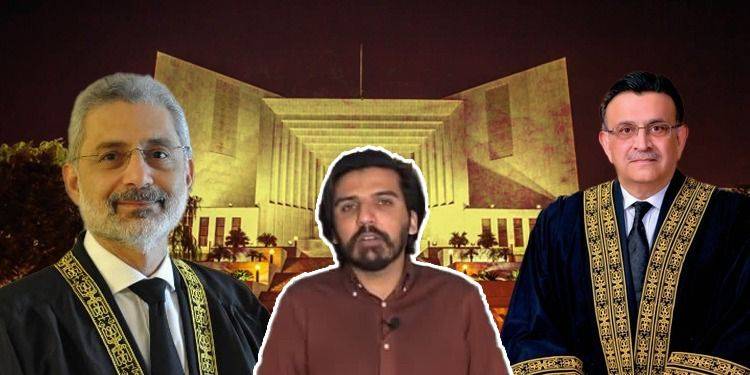
The nullification of Justice Qazi Faez Isa's order related to the CJP's suo motu powers will likely invoke a contempt of court notice of the judges against the top court's registrar, journalist Asad Ali Toor has said.
In a podcast on Saturday, Toor said there's a resentment among the judges over the registrar's act to strike down the judge's order via a circular.
He further said that the act of annulling a judicial order with an administrative order is being seen as a dangerous precedent.
The registrar may be issued a show-cause notice next week, and asked to explain his intent behind the striking down of the judge's order.
A day earlier, CJP Bandial disregarded the order issued by Justice Isa and Justice Aminuddin Khan with regard to his suo motu powers and said it violates the rules put forth by a five-member larger bench.
On Wednesday, a three-member SC bench ruled that hearing of all cases under Article 184(3), which is related to the CJP’s suo motu powers, be postponed till amendments in the SC rules.
Read this too: Justice Shahid Waheed’s Dissenting Note Was Penned By Four Judges: Hassan Ayub
“The interest of citizens therefore will be best served to postpone the hearing of this case, and of all other cases under article 184(3) of the Constitution, till the matters noted hereinabove are first attended to by making requisite rules in terms of article 191 of the Constitution,” the order read.
Besides Justice Isa, the bench comprised Justices Amin-ud-Din Khan and Shahid Waheed. Justice Waheed dissented with the majority opinion.
According to the order, the Supreme Court rules neither permit nor envisage special benches, however, a special bench comprising three judges was constituted to hear this case.
The question arises, the verdict maintained, as to why couldn’t an existing regular bench hear this case?
The judges noted that the Constitution does not grant unilateral and arbitrary powers to the Chief Justice to decide the said matters.
In a podcast on Saturday, Toor said there's a resentment among the judges over the registrar's act to strike down the judge's order via a circular.
He further said that the act of annulling a judicial order with an administrative order is being seen as a dangerous precedent.
The registrar may be issued a show-cause notice next week, and asked to explain his intent behind the striking down of the judge's order.
A day earlier, CJP Bandial disregarded the order issued by Justice Isa and Justice Aminuddin Khan with regard to his suo motu powers and said it violates the rules put forth by a five-member larger bench.
On Wednesday, a three-member SC bench ruled that hearing of all cases under Article 184(3), which is related to the CJP’s suo motu powers, be postponed till amendments in the SC rules.
Read this too: Justice Shahid Waheed’s Dissenting Note Was Penned By Four Judges: Hassan Ayub
“The interest of citizens therefore will be best served to postpone the hearing of this case, and of all other cases under article 184(3) of the Constitution, till the matters noted hereinabove are first attended to by making requisite rules in terms of article 191 of the Constitution,” the order read.
Besides Justice Isa, the bench comprised Justices Amin-ud-Din Khan and Shahid Waheed. Justice Waheed dissented with the majority opinion.
According to the order, the Supreme Court rules neither permit nor envisage special benches, however, a special bench comprising three judges was constituted to hear this case.
The question arises, the verdict maintained, as to why couldn’t an existing regular bench hear this case?
The judges noted that the Constitution does not grant unilateral and arbitrary powers to the Chief Justice to decide the said matters.

